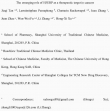The emerging role of HJURP as a therapeutic target in cancers
Abstract
Holliday junction recognition protein (HJURP) is a key molecular chaperone for centromere protein A (CENP-A), which is essential for chromosome separation during mitosis and cell cycle regulation. Recent studies have identified the essential role of HJURP in carcinogenesis. Abnormal upregulation of HJURP expression has been observed in various human cancers, such as non-small cell lung cancer (NSCLC), hepatocellular carcinoma (HCC), bladder cancer, and breast cancer, which is associated with poor pathological development and prognosis. In vitro and in vivo studies have shown that HJURP exerts oncogenic functions mainly by regulating the cell cycle, cellular senescence, and epithelial-mesenchymal transition (EMT). This review aims to evaluate the prognostic significance of HJURP in human cancers and summarize antitumor studies targeting HJURP. The effects and regulatory factors of HJURP in carcinogenesis have also been discussed to provide new insights into targeting HJURP as a promising strategy for cancer treatment.


